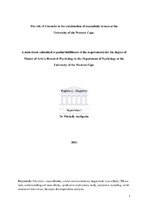The role of Ulwaluko in the construction of masculinity in men at the University of the Western Cape
Abstract
Ulwaluko is a Xhosa word that refers to male circumcision, an initiation ritual performed to transform boys into men. The ritual is supposed to instill good moral and social values. Research has demonstrated that, the practice of Ulwaluko has undergone many changes primarily because of urbanization, acculturation and the emergence of back-door circumcision schools amongst other things. This has culminated in instances of moral decline such as criminal activity, drug abuse, risky sexual behaviour and inhumane behaviour among some of the initiates. There has been a recent upsurge in research on Ulwaluko in South Africa. However, lacking in this body of scholarship is a focus on how Ulwaluko constructs masculinities. This served as the motivation for my study. Given the above, my study explored the role of Ulwaluko in the construction of masculinity in men at the University of the Western Cape (UWC). Hegemonic masculinity (Connell, 1994; Connell & Messerschmidt, 2005) was used as a theoretical framework conceptualizing this study. The study utilised a qualitative framework and data was collected using in-depth semi-structured interviews. Seven participants aged from 19 to 32, consented to be part of the study. These were recruited using purposive sampling. The ethical considerations of the study adhered to the guidelines stipulated by UWC. Data was transcribed, and analysed using thematic decomposition analysis. The findings of this study indicate that Ulwaluko constructs masculinity in hegemonic ways. Through hegemony it establishes, maintains and retains control over young men, boys and women. It constructs an idealised masculine identity that is morally upright, faced with ritual challenges and burdened by a prescriptive set of masculine role expectations. This study also shows the self-reflexive, critical and imaginative engagement by men as they negotiated Ulwaluko‟s ideal masculinity. Such contestations resulted in the creation of rival masculinities. It also demonstrates how subject position(s) impact understandings and constructions of masculinities. This study provided a richer and more nuanced contextual understanding of the psychosocial realities of men who underwent Ulwaluko

